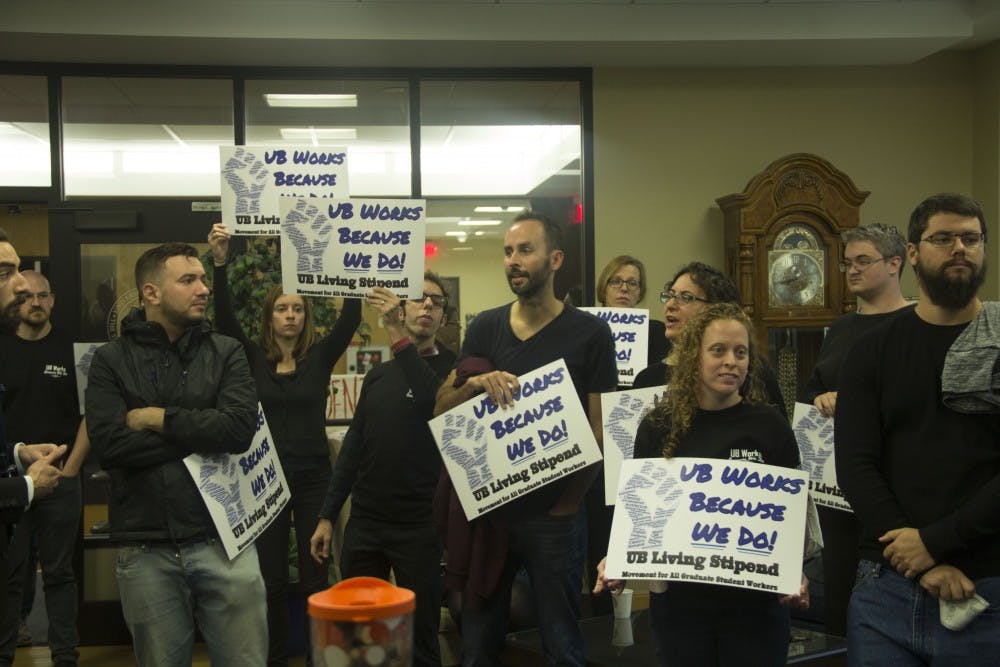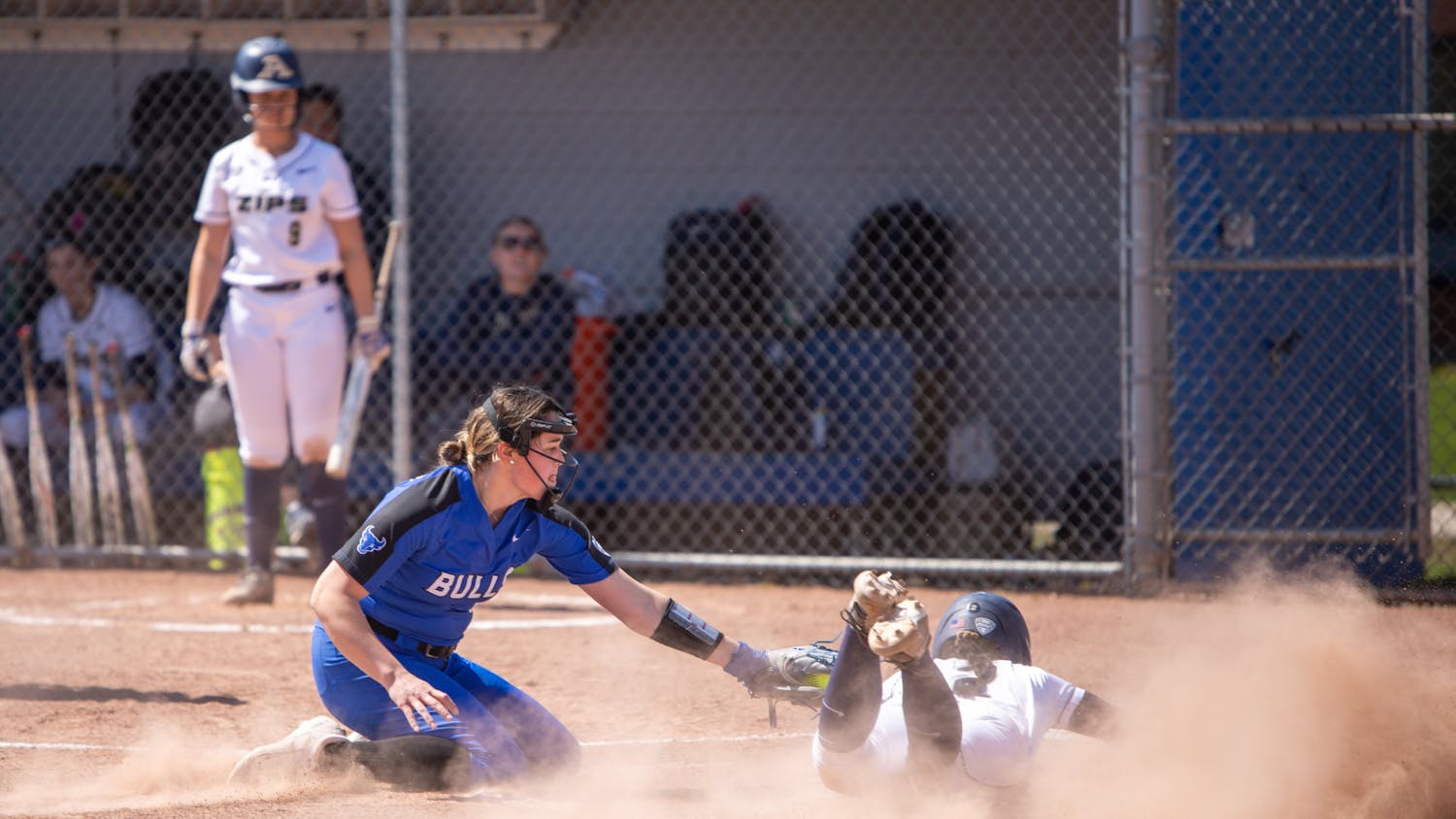Despite two graduate students being permitted into Monday’s UB Council Meeting, chairman Jeremy Jacobs adjourned the meeting without letting them voice their concerns about graduate stipend levels.
Before the end of the meeting, council student representative Mike Brown proposed a brief period of public comment for biological sciences Ph.D. student Stephanie Gill and English Ph.D. student Arianna Nash to talk about stipend concerns.
Jacobs said he’d take that into consideration and then motioned to adjourn.
After the meeting concluded, council members used a back staircase to exit the building to avoid confronting the roughly 50 graduate students and faculty members peacefully protesting outside Capen 505.
Members of the UB Living Stipend movement who filled the space outside the elevators on the fifth floor of Capen had been waiting to speak to council members since 7 a.m.
After the meeting, Nash reported to colleagues waiting outside about the content of the meeting and that she was not allowed to speak about graduate stipends. She complained that only two graduate students were allowed entry even though there was extra space in the room.
“We were barred from entering the meeting because of the size of the room,” Nash said. “The occupancy of the room is 38, and there were 28 people in that meeting. So 10 of us could have been there. That violates New York State law because it is a public meeting and we are allowed to be there. We will be pursuing that fact and making sure that at the next meeting there is room for us.”
University Police Department Deputy Chief Police Joshua Sticht stood in between the crowd and meeting room. He said setting up chairs and a projector reduced the total number of people allowed in the room.
“I think there are some issues there. They have to make a decision about how many [people] they can safely put in the room and one of those is a number that Environmental Health and Safety makes,” Sticht said. “They made a determination based on bodies in the room, but when they started putting equipment in the room, that chipped away at that number.”
The university released a statement prior to the council meeting, explaining measures the university has taken to increase stipends in recent years and what the UB Foundation’s unrestricted funds are distributed.
“UB's average stipend is on par with the stipends paid by other leading research universities, just below the $18,408 average of the 24 institutions that provided data to the Association of American Universities Data Exchange for 2017-18,” according to the press release.
Across the university, graduate students receive an average stipend package of $38,000 for the nine-month academic year in return for 20 hours of service per week.
Last year, the College of Arts and Sciences increased stipends in the English department from $15,000 to $18,000. By 2020, the stipend will increase to $20,000.
Provost Charles Zukoski reinforced measures that UB has taken to increase stipend levels, and said that the eventual increase in 2020 will place UB above the national graduate student stipend average.
Graduate students were frustrated and disappointed that they were not allowed access into the meeting, Michael Morse, a Ph.D. student in the physics department, said.
“I think they’ve created a bigger problem for themselves by barring entry,” Morse said. “It was my understanding that people were going to go in, stand there and be respectful and just make their presence heard. By barring entrance, they’ve created all this commotion.”
Faculty stood by their students in support of a higher stipend.
English professor Jim Holstun attempted to enter the meeting but was denied. He recorded the morning’s events on his camera and said he will post it on the Living Stipend Movement’s website.
Holstun has been major force in the movement’s presence on campus while speaking up at Faculty Senate meetings and during protests. He said although UB says its stipends are competitive, compared to other schools, he thinks they’re too low.
“The University at Buffalo brags about being a member of the American Association of Universities, as they should. Alas, the average stipend is under $13,000 a year for graduate assistants, placing them 34th out of 34 in the [organization],” Holstun said. “The lowest stipend is under $8,000 a year which is off the charts. Our students are being destroyed, and it’s the UB Council’s responsibility to keep that from happening.”
Associate English professor David Alff said graduate students deserve more support.
“We need to give [our graduate students] a secure financial basis from which to do the hardship of becoming professors,” Alff said. “UB has the resources to do this, the UB Foundation has the resources to do this, and we owe it to our graduate students, they teach so many of our classes, they do so much of the hard work of mentoring and teaching undergraduates, and they deserve to have a living wage and exist in Buffalo outside of poverty, that's why I'm here this morning.”
Inside the meeting, President Satish Tripathi gave a rundown of the university’s recent accolades –– including being named the number one public university in New York State –– and advancements in artificial technology.
Zukoski also discussed UB’s record enrollment numbers and the 70 new faculty members hired for the school year.
Senior associate dean for medicine and education Nancy Nielsen gave a presentation on opioid deaths in Western New York and informed the council of measures the medical school is taking to help the local crisis.
After council members left Capen Hall, protestors chanted “We’ll be back” as they left the building. The UB Living Stipend Movement will attend the State of the University Friday Oct. 12 in Lippes Concert Hall in Slee Hall.
Jacklyn Walters, Cian Gonzalez and Nathan Gardner contributed reporting for this article.
Max Kalnitz is the senior news editor and can be reached at max.kalnitz@ubspectrum.com





